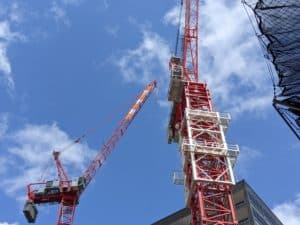
Cranes at work on the site of Hines’ South Station tower in Boston. The largest developments typically dodge the city’s Zoning Board of Approval with tools like PDAs, but the board holds sway over hundreds of smaller projects, many apartment buildings, each year. Photo by James Sanna | Banker & Tradesman Staff
It’s not clear what prompted Boston Mayor Michelle Wu to decide now is the time lower the boom on the city’s Zoning Board of Appeals.
Wu announced she was replacing 10 of the 14 members of the ZBA last week, including the long-time chair of the powerful panel, which the mayor has long targeted for an overhaul.
As a city councilor on the rise, Wu took the pages to denounce of the Globe to denounce the “complicated and sometimes arbitrary process” through which the board decides the fate of hundreds of projects each year, from home additions to big apartment buildings.
But that was a little over two years ago. Instead, Wu’s focused her first 10 months in office on laying the groundwork to revamp the better-known Boston Planning & Development Agency, which oversees most development in the city while all but one of the ZBA’s membership continued to serve without replacements long after their original terms had expired.
Why Act Now?
Based on Wu’s own master plan for overhauling how development is done in Boston, the decision to blow up the ZBA would appear to be a bit premature.
Her vision calls for the BPDA to first revamp building rules across the city, from downtown to the neighborhoods, to staunch the never-ending flow of requests, appeals and disputes that end up before the ZBA.
But redoing zoning across the city is a major project, and even the most ardent Wu supporters would be hard-pressed to argue that goal is anywhere close to being accomplished.
So why act now? One possible factor, though, may have been an increasing ugly dispute in the mayor’s own neighborhood of Roslindale over plans for badly needed new housing in which the ZBA has played a starring role.
When Wu released her slate of 10 nominees for seats on the ZBA, she also decided to keep four current members, a group that pointedly didn’t include the longtime chair and Wu’s fellow Roslindale resident, Christine Araujo.
Araujo has become a lightning rod for her pivotal role in killing several housing projects, most notably in Roslindale.
An appointee of former mayor Marty Walsh, she was outspoken in casting crucial “no” votes against a 31-unit apartment complex in Roslindale Square and a seven-unit, two-storefront apartment building by the Target on Washington Street, Universal Hub reported.
Araujo criticized the first project for not providing any parking and the second, smaller proposal for not providing enough parking spaces.
The outgoing ZBA chair also made comments seen as dissing Roslindale’s commuter rail station as not real mass transit – though, in her defense, Araujo countered in an interview that she is concerned about the high prices low-income workers have to pay to ride those trains.
Chair Was YIMBY Group’s Foe
Those stances raised the hackles of WalkUP Roslindale. The nonprofit group, which advocates for pedestrian and cyclist friendly streets and transit-orientated development, is a strong backer of their mayor-neighbor.
And WalkUP Roslindale has been pushing openly for an overhaul of the ZBA for months, appealing directly to the mayor and lobbying for action on Twitter.
“The chair has been the biggest obstacle on the board to new housing production in Roslindale,” said Rob Orthman, chair of WalkUP Roslindale’s housing and development committee, after Wu’s decision to replace most of the ZBA was announced. “I am overall happy with the new appointments and have heard good things about a number of them from my network.”
Pushing back, Araujo said she was trying to balance proposals for new housing with quality-of-life issues for existing Roslindale residents, like parking.
The nonprofit consultant also expressed frustration over a lack of a larger, strategic plan for dealing with the pressure colleges put on neighborhood rental markets and other aspects of the region’s housing crunch. And she expressed skepticism over how much impact smaller projects with only a handful of affordable units can have.
“We need to look at it comprehensively – at what is putting the pressure of demand on our housing stock,” she said.
Not So Fast
All that said, is it possible Wu was forced to act earlier on the ZBA than she would have liked?
For the timing would not seem ideal. There is growing apprehension on part of developers and other members of the real estate industry over the many changes Wu is either overseeing or talking about when it comes to how real estate projects are vetted. These include tough new greenhouse-gas emission standards for building, the potential for some form of rent control and demands for higher percentages of affordable units.

Scott Van Voorhis
Fair or not, there is perception on part of some developers and real estate attorneys that Wu’s slate of new board members, heavy on community development and nonprofit types, will tilt the board to the left, adding new and potentially expensive or onerous conditions to projects.
However, all that is now on hold, with the City Council on Wednesday hitting the pause button on Wu’s overhaul of the ZBA.
While supporters of Wu’s push to revamp the ZBA had hoped for a quick vote of approval, the council instead sent the nominees to transportation and development committee for review and a possible public hearing.
And the chair of that committee? That would be City Councilor Frank Baker, one of the more conservative members of the council and someone potentially less inclined to give a quick green light to Wu’s proposal.
Stay tuned.
Scott Van Voorhis is Banker & Tradesman’s columnist; opinions expressed are his own. He may be reached at sbvanvoorhis@hotmail.com.




 |
| 

